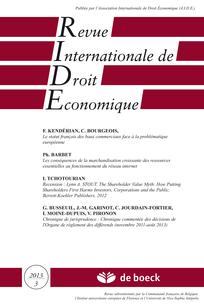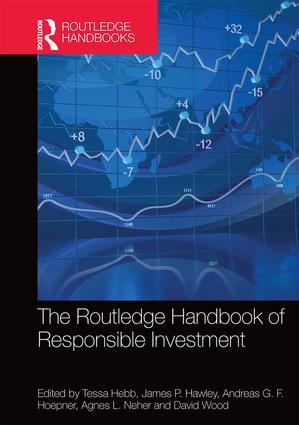autres publications Gouvernance place des salariés
Employee Participation in Corporate Governance and Corporate Social Responsibility : à découvrir !
Ivan Tchotourian 23 août 2016
Nouveau working paper de Martin Gelter pour le compte de l’ECGI intitulé : « Employee Participation in Corporate Governance and Corporate Social Responsibility » (Law Working Paper No. 322/2016, juillet 2016).
The chapter investigates the impact of employee participation on the board of directors or supervisory board (particularly codetermination) on corporate social responsibility (CSR).
Conceptually, it is important to distinguish between “internal” and “external” CSR. Internal CSR relates to practices of the firm regarding groups with which it is in a long-term contractual relationship such as employees. Employee participation systems serve to protect employees from shareholder opportunism and shift the balance in the distribution of corporate rents in favor of employees, which is why they clearly have an impact on internal CSR. The situation is much less clear for external CSR, which is concerned with effects of corporate activities that are externalities, for example pollution.
I argue that there may sometimes be a tradeoff between internal and external CSR: If a firm is more profitable because it scores badly in terms of external CSR (e.g. because it habitually pollutes), employees may benefit similarly as shareholders. In fact, the interests of shareholders and employees may be largely aligned in this respect, with both either benefiting or being harmed concurrently.
À la prochaine…
Ivan Tchotourian
autres publications Gouvernance Normes d'encadrement normes de droit normes de marché
Governance goes green : à lire !
Ivan Tchotourian 6 juillet 2016
Beau rapport du cabinet Weil, Gotshal & Manges LLP qui montre que la RSE ne peut plus être ignoré par les entreprises : « Governance Goes Green ».
It’s not just us tree-huggers. Increasingly, institutional investors, pension plans and regulators are calling for (and in some cases requiring) companies to assess and report on the sustainability of their business operations and investments. Climate change and other environmental concerns are at the forefront of these calls. Institutional investors are focusing on sustainable business practices – a broad category in which environmental and social risks, costs and opportunities of doing business are analyzed alongside conventional economic considerations – as a key factor in long-term financial performance. Sustainability proponents are looking to boards of directors and management to integrate these considerations into their companies’ long-term business strategies.
Éléments essentiels à retenir :
- Institutional investors increasingly regard environmental and other sustainability issues as strategic matters for companies.
- Shareholders continue to submit environmental and other sustainability proposals, successfully garnering attention and prompting companies to make changes, despite their failure to win majority votes.
- Independent organizations are developing standards for sustainability and environmental reporting to provide investors with consistent metrics for assessing and comparing the sustainability of companies’ practices.
- Sustainability and environmental reporting remains in the SEC’s sights as it evaluates the effectiveness of current disclosure requirements and considers changes for the future.
À la prochaine…
Ivan Tchotourian
autres publications Nouvelles diverses
Baromètre de l’achat responsable 2016 : publication des résultats (exclusif !)
Ivan Tchotourian 16 juin 2016
L’ECPAR vient de rendre public les résultats de son baromètre de l’achat responsable 2016. Le Baromètre de l’achat responsable mesure et rend compte des pratiques et avancées en matière d’achat responsable. Je suis à la conférence présentement et vous divulgue en exclusivité le bilan. Qu’en retenir ?
- Plus de 90 % des 76 entreprises canadiennes ayant participé pratiquent de l’achat responsable.
- Parmi elles, 46 % déclarent que l’intégration totale du développement durable à leur modèle d’achat est un objectif de priorisation de leurs actions.
- Cette étude fait état de l’avancement des pratiques d’achat responsable en particulier au Québec.
Belle nouvelle pour la RSE !
À la prochaine…
Ivan Tchotourian
autres publications Normes d'encadrement objectifs de l'entreprise Valeur actionnariale vs. sociétale
La valeur actionnariale au rancart !
Ivan Tchotourian 31 mai 2016
Belle tribune de la professeure Lynn A Stout : « The Myth of Maximizing Shareholder Value » (OpenEdNew, 23 mai 2016).
By the end of the 20th century, a broad consensus had emerged in the Anglo-American business world that corporations should be governed according to the philosophy often called shareholder primacy. Shareholder primacy theory taught that corporations were owned by their shareholders; that directors and executives should do what the company’s owners/shareholders wanted them to do; and that what shareholders generally wanted managers to do was to maximize « shareholder value, » measured by share price. Today this consensus is crumbling. As just one example, in the past year no fewer than three prominent New York Times columnists have published articles questioning shareholder value thinking. Shareholder primacy theory is suffering a crisis of confidence. This is happening in large part because it is becoming clear that shareholder value thinking doesn’t seem to work, even for most shareholders.
Je vous laisse lire la suite…
Pour rappel, j’avais eu l’occasion de faire une recension du très bel ouvrage de Lynn A Stout dans la Revue international de droit économique – 2013/3 ((t. XXVII)) – : ici.
Lynn A. STOUT, The Shareholder Value Myth: How Putting Shareholders First Harms Investors, Corporations and the Public, Berrett-Koehler Publishers, 2012
1 – Un sujet d’une grande actualité
2 – Remise en cause de la norme de primauté actionnariale
3 – Les actionnaires d’aujourd’hui
4 – Mise en perspective de l’ouvrage
À la prochaine…
Ivan Tchotourian
autres publications Nouvelles diverses
UK Business: What’s wrong? What’s next?
Ivan Tchotourian 30 mai 2016
Tomorrow’s company vient de publier un très intéressant rapport intitulé : « UK Business: what’s wrong? what’s next? ».
The approach that we take to making companies successful affects everything we do and everything we value as a society. Too often we look to politicians for the answers to all our problems, when in reality it is companies that develop new products, provide employment and invest for the future. The world faces considerable challenges over the next few decades. A different business approach will be critical in overcoming these. In 2015 Tomorrow’s Company brought together leaders across business, government, and NGOs to develop a positive and practical vision for how companies can be a force for good in the future.
À la prochaine…
Ivan Tchotourian
autres publications normes de marché
En savoir plus sur l’ISR ?
Ivan Tchotourian 25 mai 2016
Bonjour à toutes et à tous, si la problématique si actuelle de l’investissement socialement responsable (ISR) vous intéresse, nul doute que ce bel ouvrage suscitera votre curiosité : « The Routledge Handbook of Responsible Investment » (T. Hebb, J. P. Hawley, A. G.F. HOEPNER, A. L. Neher et D. Wood) chez Routledge.
The UN-supported Principles for Responsible Investment initiative has led to around a third of the world’s financial assets being managed with a commitment to invest in a way that considers environmental, social or governance (ESG) criteria. The responsible investment trend has increased dramatically since the global financial crisis, yet understanding of this field remains at an early stage.
This handbook provides an atlas of current practice in the field of responsible investment. With a large global team of expert contributors, the book explores the impact of responsible investment on key financial actors ranging from mainstream asset managers to religious organizations.
Offering students and researchers a comprehensive introduction to current scholarship and international structures in the expanding discipline of responsible investment, this handbook is vital reading across the fields of finance, economics and accounting.
À la prochaine…
Ivan Tchotourian
autres publications Nouvelles diverses responsabilisation à l'échelle internationale Structures juridiques
Banques et paradis fiscaux : encore un rapport accablant
Ivan Tchotourian 19 avril 2016
La journaliste du Monde (Mme Anne Michel) relaie un intéressant rapport qui nous apprend que les banques françaises réalisent des profits juteux dans les paradis fiscaux (ici).
Les banques françaises abusent-elles des paradis fiscaux ? Dans un rapport inédit, fondé sur des données officielles, et publié mercredi 16 mars, trois organisations non gouvernementales (le Comité catholique contre la faim et pour le développement-Terre solidaire –CCFD, Oxfam France et le Secours catholique-Caritas France) associées à la Plateforme paradis fiscaux et judiciaires, un réseau anticorruption, livrent ce chiffre choc : à elles cinq, BNP Paribas, la Société générale, BPCE (Banque populaire-Caisse d’épargne), le Crédit agricole et le Crédit mutuel-CIC ont réalisé 5 milliards d’euros de bénéfices dans des pays à basse fiscalité en 2014.
Ce montant est important : il représente le tiers des profits réalisés par ces banques hors de France (15,3 milliards d’euros au total). Le Luxembourg, dont la place financière a prospéré grâce à son régime fiscal ultra-avantageux pour les multinationales, accueille à lui seul 11 % de ces bénéfices ; ce qui en fait le troisième pays le plus lucratif pour ces groupes bancaires après la France et les Etats-Unis.
À la prochaine…
Ivan Tchotourian



